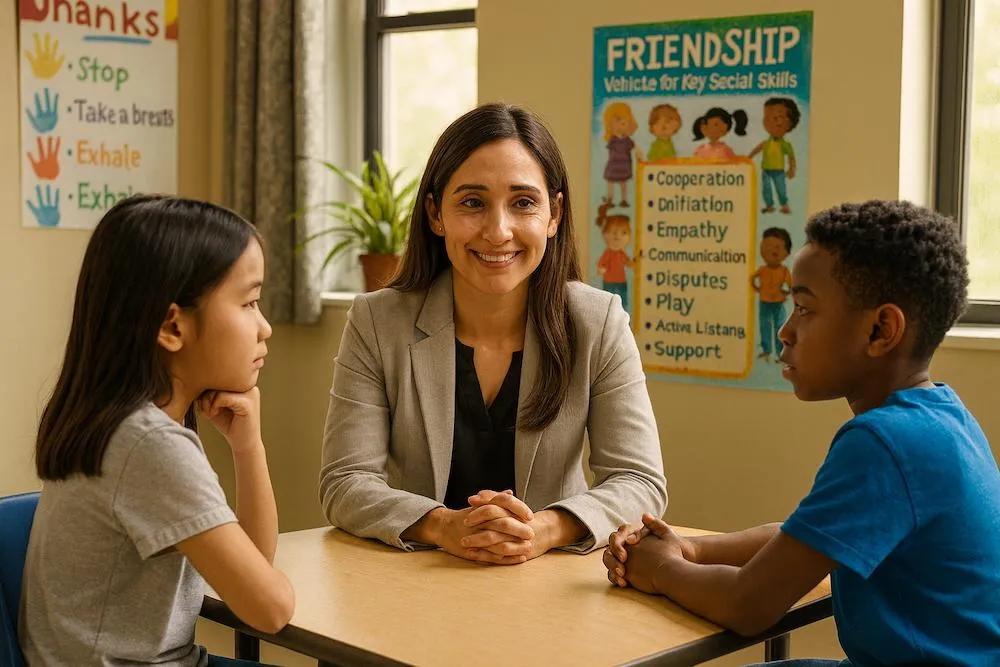
Got Friendship Struggles? Try Discernment Counseling and the Solution-Focused Approach!
It’s not unusual for elementary and middle school students to come into our offices with tears, frustration, or even folded arms, clearly upset about a friend who “suddenly stopped talking to them” or who “chose someone else” at recess.
Friendship issues can feel enormous to students, because in many ways, they are.
And yet, when we listen closely, we often hear something else too.
We hear students unsure of what they really want.
Do they want the friendship back?
Are they ready to move on?
Or are they somewhere in between?
That’s where ideas from *Discernment Counseling can help us frame our conversations more effectively. This approach was created by two of my colleagues, Bill Dougherty and Steven Harris.
The model was created to help couples get clarity on their relationship so they can make a better decision whether to divorce or stay together. Discernment Counseling invites people struggling with relationships to explore three paths:
Path 1: Stay in the friendship with no change.
Path 2: End the friendship and pursue new friends.
Path 3: Commit to trying something different for a short time to see if the friendship can work again.
In schools, this model translates beautifully to students struggling with friendships. It is a great guide to help the students reflect and figure out their path forward.
Here’s how I’ve adapted this to my work with students.
Start: Tell me, what can we talk about that could begin to help you with this situation.
It sounds simple, but this question often brings clarity. Students might say, “I don’t know.” That’s okay! Their “I don’t know” becomes a starting point. This way you refrain from assuming what to talk about and let the student lead you, a key element of the solution focused approach.
Share the three paths above. Then, continue, with questions below, designated for each path.
If the student does not know exactly what she needs to change but wants to stay in the friendship with no change, talk about not knowing what to do makes sense. Then consider saying:
“It makes sense that you’re not sure yet. You’ve been through a lot.”
“What would help you decide what you really want?”
If the student wants to let the friendship go, be supportive and consider asking:
“What did you like about that friendship that you hope to find again?”
“What will be a sign that someone might be a good friend to you?”
If the student wants to save the friendship, consider bringing the friend into the conversation and asking both students:
“Tell me about a time lately when you and your friend still got along, even just a little?”
“What did you each do that helped in that to happen?
“Someday, if this friendship got better, what would be happening differently for both of you?”
“What would you both notice someday when the friendship works better?”
“What might you both try just for today (or tomorrow) that could help that future happen, even just a little?”
“Would you be willing to try out some of these ideas for a day?”
This process is often very helpful, especially since, like adults, students think there are only two paths. The addition of the third path is a healthy way to share with students how to discern between good and not so good relationships.
Friendship challenges can be growth opportunities. When we approach them with curiosity, empathy, and a belief in our students’ resourcefulness, we empower them to learn their part in good relationships and to figure out when to step away from a friendship.
And that is a gift they carry for life.
By the way, this coming weekend, come learn about The Friendship Squad, from Diane Busch, a session in the Solution Focused Schools Unlimited virtual conference!
Check out the link here and join me and others who want to apply the approach to every aspect of your school counseling life!
*Doherty, W. J., & Harris, S. M. (2017). Helping Couples on the Brink of Divorce: Discernment Counseling for Troubled Relationships. Norton.
